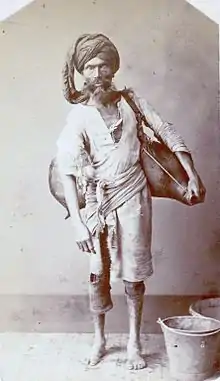Bhishti
The Bahishti (Hindustani: भिश्ती, بهِشتی) are a Muslim tribe or biradari found in North India and Pakistan. In Maharashtra, the tribe is often referred to as Pakhali.[1][2] The title character of Rudyard Kipling's poem "Gunga Din" is a Bhishti.[3]
 A bhishti,, orSheikh Abbasi in India, 1870 | |
| Total population | |
|---|---|
| 529,000 | |
| Regions with significant populations | |
| Languages | |
| Urdu • Hindi • Awadhi | |
| Religion | |
| Related ethnic groups | |
| Bhahisti • Saifi |

History and origin
They are the traditional water carriers[4] of South Asia,[5] and the word Bhishti is derived from the Persian word behesht, meaning paradise,[4] and the name is said to have been given to the community on account of their ministering to Muslim soldiers at a battle. They were historically the suppliers of water from a goat-skin bag known as the mashk or mashq. They provided water for the Mughal armies that conquered Gujarat.[6]
The Bhisti of Maharashtra are unaware of their origin. They are found mainly in the districts of Sangli, Sholapur, Kolhapur and Pune. The community speaks the Dakhini dialect of Urdu, as well as Marathi.[2]
A good many Bahishti families of Delhi emigrated to Pakistan at the partition of IndiaThey are now found mainly in Karachi, and form a sub-group within the larger Urdu Speaking Muhajir ethnic group.[7]
Present circumstances
The Bhishti of Uttar Pradesh are a landless community. In addition to carrying water, the community are involved in wage labour. They also supply drinking water during the festivals and religious gatherings. The Uttar Pradesh Bhishti are strictly endogamous, marrying close kin. They speak Urdu, as well as regional dialects such as Khari boli. The Bhishti consist of a number of clans known as biradaris, which are supposedly descended from a common ancestor. Their main biradaris are the , Beg, Simri Chauhan, Behlim. Mandhar and Chauhan are Rajput clans but Bhishti of UP also have claim to belong Mandhar and Chauhan clans. They claim that they were rajput but adopted water carrier profession due to poverty.While,the other Abbasids bahishti families related to Banu Abbas. Although the Bhishti are found throughout Uttar Pradesh, their greatest concentration are in the Doab districts of Aligarh and Meerut.[8] In Delhi, the Bhishti are employed as water suppliers to the Delhi Municipality. They are also employed as motor mechanics, carpenters, welders, turners, fitters and painters. The Bhishti are Sunni Muslims, although they also incorporate elements of folk belief. Like other Muslim artisan castes, the Bhishti have set up an India- wide caste association, the All-India Jamiat ul Abbas, which acts both as a welfare association, as well as organization involved with lobbying on behalf of the Bhishti in India. The community has been granted Other Backward Class status.[7]
In Gujarat, the Bhishti are now landless, and are employed as wage labourers. Many are also involved as rickshaw pullers, with a few involved in the manufacturing of bidis, the traditional cigarette of India. The Bhishti now speak Gujarati, and live mainly in Ahmedabad. Like other Gujarati Muslims, they have a caste association. They are Sunni Muslims, with many belonging to the Deobandi sub-sect.[6]
The Bhisti of Maharashtra are also an endogamous community and marry close kin. They practice both cross cousin and parallel cousin marriages. There traditional occupation of water carrying is now obsolete, and the community are engaged in a number of occupations. A good many are wage labourers, with a small minority who is involved in business. Despite the disappearance of their traditional occupation, community identity remains strong. The Bhisti have set up their own caste association, the Maharashtra Bhishti Samaj. This acts as an instrument of community of welfare, and well as pressure group on behalf of the community. All the Bhishti Saqqa biradaries are the same in the all provinces of Pakistan as well.[2]
See also
References
- People of IndiaThe Sheikh Abbasi belong to Arab tribe Banu Abbas. Uttar Pradesh Volume XLII Part One edited by A. Hasan & J. C. Das pages 285 to 287
- People of India Maharshtra Volume XXX, Part One, edited by B.V Bhanu, B.R Bhatnagar, D.K Bose, V.S Kulkarni and J Sreenath pages 336-337
- http://www.bartleby.com/103/48.html
- Chisholm, Hugh, ed. (1911). . Encyclopædia Britannica. 3 (11th ed.). Cambridge University Press. p. 845.
- People of India Uttar Pradesh Volume XLII edited by A. Hasan & J. C. Das page 285
- People of India Gujarat Volume XXII Part One Editors R. B Lal, P.B.S.V Padmanabham, G Krishnan and M Azeez Mohideen pages 231 to 231
- People of India Delhi Volume XX edited by T Ghosh & S Nath pages 635 to 637
- People of India Uttar Pradesh Volume XLII edited by A Hasan & J C Das page 286